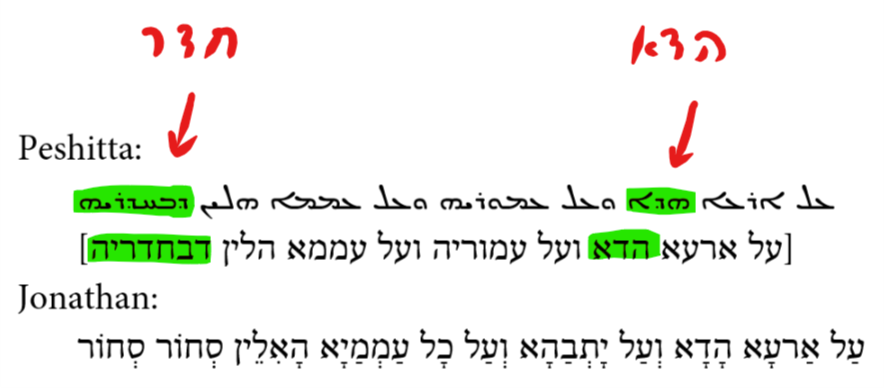I do not know how I list your words as a quote. But I try.
The basic difference between our approaches is that I take the text as it stands, but you read words and ideas into the text that are not found there. With all respect for you as a scholar, I must say that a meaningful discussion of a particular text when this method is followed is not possible. It is like chasing ghosts. When we can add words to a text and say that this is the meaning, there are no restraints any longer. As for my part, I will discuss the text of the verse and not a supposed text.No, סביב [sāḇîḇ] is not "modifying" the noun phrase in the most direct sense. However, it certainly acts like an adjective, as if there were a missing verb. "All these nations [which are] around [them]." Notice that סביב can indeed take personal endings and must be understood in that way. We should read it as if it were כל הגוים האלה [אשר] סביב[ם] [kol-haggôyim hāʾḗleh (ʾăšer) səḇîḇ(ām)], with at least a relative particle inserted, if not also the mem added at the end. This is what is going on in the mind with such a construction, though the construction itself doesn't require any additional pieces. It's completely fine as-is.
The adverb would clearly be outside of the noun phrase and "modifying" the entire phrase (כל הגוים האלה) and not just the head noun (גוים). It is telling where (adverbial) "all these nations" are that are being mentioned.
Your point that סָבִ֑יב can take personal endings is important, because such a personal ending shows what סָבִ֑יב is around, for example “the nations around you (סְבִיבֽוֹתֵיכֶ֔ם)” in Ezekiel 5:7. This personal ending is lacking in 25:9, and this speaks against the meaning “surround,” because nothing is mentioned that could be surrounded.
I agree completely with your last paragraph, where you say that the clause in 25:9 tells where all the nations are. And this shows that the rendering “surrounding nations” violates the syntax of the clause, because סָבִ֑יב modifies the whole noun phrase and not only הַגּוֹיִ֥ם. So, the question is: Where are כָּל־הַגּוֹיִ֥ם הָאֵ֖לֶּה? I can see two possibilities, as illustrated in the examples below. In example 1) סָבִ֑יב has a personal pronoun attached, which clearly shows that the meaning is “surround.” However, in example 2) the context implies that סָבִ֑יב is used in the sense “throughout” or “round about” —inside the land of the Philistines. Thus 1) refer to a specific place (around you), while 2) does not refer to a specific place, but is ambiguous.
1) Ezekiel 5:7 because you were more unruly than the nations around you (סְבִיבֽוֹתֵיכֶ֔ם).
2) 1 Chronicles 10:9 “throughout (סָבִ֑יב) the land of the Philistines”
Example 2) shows that סָבִ֗יב can refer to unspecified places inside a country, and example 1) shows that it can refer to places outside a country. I cannot see any word or accent mark in 25:9, on the basis of which we can know whether כָּל־הַגּוֹיִ֥ם הָאֵ֖לֶּה are inside or outside Judah. Therefore, I find that the renderings of American Standard Version and Revised Standard Version are very fine: “all these nations round about.” These translations show the ambiguity of the word סָבִ֑יב, and they leave it to the reader to find out who these nations are and where they are.
I will remind you that the translators of the LXX most likely believed that "all these nations" referred to nations outside Judah, while the Peshitta explicitly shows that they are inside Judah.
Best regards,
Rolf Furuli
Stavern
Norway
